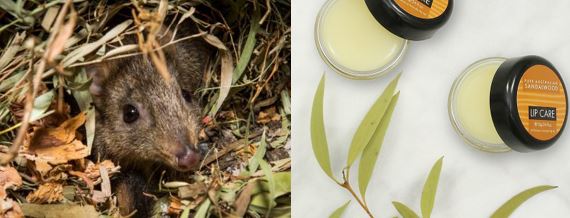Sandalwood has been used for thousands of years by ancient civilisations globally. One of the earliest recorded use of Sandalwood in medicine, was found in ancient Chinese transcripts. Other uses include furniture making/ carvings, religious uses in the East, such as China, Korea and Japan; for attars, funeral pyres, chewing tobaccos and medicines in places like India and for customary and religious rites in the Middle East. Even in ancient Egypt, sandalwood had a variety of uses, from creation of scents and lotions, makeup to embalming the dead. In each culture, sandalwood signified something unique- both in the way that it is understood and used.
There are over twenty types of sandalwood species worldwide, found naturally in India, Indonesia, Australia and the Pacific Islands. However excessive harvesting without adequate management and replanting has meant that there has been supply shortages worldwide. So there has been a shift for sandalwood plantations to replace wild-harvested sources to meet the consistently strong demand for sandalwood products. Australia on the other hand, has emerged as a major producer of sandalwood, notably Santalum spicatum, a native species in WA which has remained relatively well-controlled in comparison.
It can be argued that this is largely attributable to the Forest Products Commission (FPC). The FPC was established in 2000 to progress, promote and sustainably manage the State’s timber resources for the people of Western Australia. The Commission operates under an Act of parliament as a Statutory Authority which enables them to manage the State’s commercial forestry activities- sandalwood is one of their three areas of responsibility. Santalum spicatum is a small hemi-parasitic tree that partially depends on host trees to acquire nutrients and water for its survival. For the last four years, Santalum spicatum harvesting by the FPC did not exceed their license limits of 2,250 tonnes.
After harvest each year from around September to April, the FPC is involved in sandalwood reseeding. Sandalwood reseeding has been challenging the last few years, the given reasons being lack of rainfall and variability in weather. According to FPC’s annual report for 2019-2020, establishment of sandalwood seedling was below the average target of 50,000 seedlings per annum.
This relates very much to the disappearance of the Woylies, a native marsupial that has evolved with our native WA sandalwood. Back in 2005, the FPC conducted research in conjunction with Murdoch University and found that Woylies not only ate sandalwood nuts, they also hoarded them by continuously burying them in the ground in view that the hard shell would soften over time enabling them access to the nut inside the fruit. Of course, not all nuts got eaten and research findings concluded that there is a strong correlation with Woylie populations and Santalum spicatum’s ability to regenerate. This highlights the need for more investment in Woylie rehabilitation programs as well as innovations required in replenishment of Santalum spicatum, whether it be timing of planting, seed treatment, harvesting schedule, reduction in thinning of sandalwood plantings or species selection or management of host trees practices.
In January 2019, the Biodiversity Conservation Act 2016 and its Regulations bacame applicable to the native sandalwood industry- further changing the landscape and its complexity. The underlying idea is for forest regeneration to be truly successful, true biological diversity must be maintained. Another bubbling drive for change within the native WA sandalwood industry is the push for more Aboriginal involvement, by increasing economic development opportunities and improving industry access for Aboriginal communities.
The Sandalwood Shop cares for our Woylies and recognises that sustainability is the new norm in our current climate. For the month of January, we are donating a dollar from every Lip care pot sold to go towards Maroo Wildlife Refuge. Our WA sandalwood resource is no doubt one of the world’s largest remaining source of wild sandalwood. For this to remain viable in the long-term, evolution of industry and stakeholders is unavoidable. After all things always appear impossible until it’s done.
Product of the month - 10g Lip care pot
Made with nourishing Sandalwood nut oil in a hydrating beeswax blend, our SPF15 Lip Care Pot is the perfect companion to help your lips stay in top form over summer!
$1 from every Lip care pot sold goes to Maroo Wildlife Refuge
Upcoming events:
- Valentine's Day Event (Sunday, 14th Feb, 2021) ~ Gong session, cuppa & cake for two for $50*
- Sandalwood Nut High Tea (Sunday, 21st March 2021) ~ As part of the Taste Great Southern, BUY TICKETS NOW
* Limited availability, please book by phone on (08) 9845 6817 or email to avoid
disappointment.
Online Reward Club Ends 28th Feb 2021
Friendly reminder that the Rewards Club loyalty program will cease next month. All loyalty points will need to be utilised prior to this date.
If you need assistance applying your points please contact 1300 362 162
Watch this space as we work to bring you more value and rewards as 2021 unfolds.



